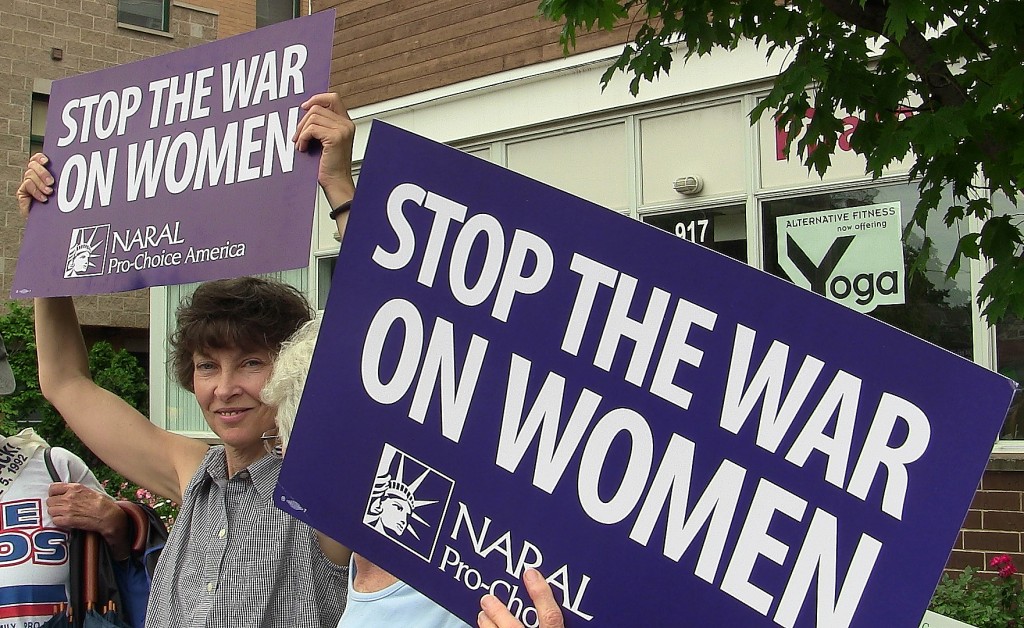MARCH IS A BIG MONTH FOR WOMEN IN THE SUPREME COURT, as the Justices hear arguments for two major cases of consequence for women’s reproductive rights. The cases involve restrictions on access to abortion and contraception. Each case is outlined below, followed by consideration of their expected outcomes.
Whole Woman’s Health v. Hellerstedt
The case of Whole Woman’s Health v. Hellerstedt challenges a 2013 Texas law that will have the impact of reducing the number of abortion clinics in the state from 40 to as few as 6, The Atlantic reports. The law places two strenuous requirements on abortion providers: that their clinics qualify as “ambulatory surgical centers” and that providers are able to admit patients to a hospital within 30 miles of the clinic. The Supreme Court will have to decide whether the restriction on access to abortion posed by these requirements is justified by health and safety gains for women.
In order to qualify as “ambulatory surgical centers,” many of the clinics would need to take on expensive renovations, including widening hallways and installing air filtration systems, explained Think Progress. The requirements, which also involve sanitation, supply, and personnel standards, are designed to ensure that facilities are equipped for surgeries and emergency situations.
The Texas legislature took testimony from medical experts who highlighted complications that sometimes occur with both medical and invasive abortion procedures. These complications may require emergency care, and can include hemorrhaging, uterine perforation, and infection. The testimony also included arguments for the hospital admitting privileges requirement of the Texas law: the logic behind this requirement is that 1) it facilitates “continuity of care,” meaning the same doctor performing the procedure can continue to care for the patient (or be involved in some way) should she need further care; and 2) possessing admitting privileges requires that a doctor be monitored by the hospital, helping ensure doctor quality.
However, the Texas legislature received another brief from the American College of Obstetricians and Gynecologists, the American Medical Association, the American Academy of Family Physicians, The American Osteopathic Association, and the American Academy of Pediatrics rebutting the arguments for the Texas law’s requirements. The brief noted the extremely low complication rate of various types of abortion procedures and the fact that the procedure (even when invasive as opposed to medication-induced) does not involve an incision into the body like surgical procedures do. Concerning the admitting privileges requirement, the brief explained that doctors may be denied such privileges for reasons that have nothing to do with the quality of their services, and that current medical protocol already facilitates the continuity of care.
Arguments for the case were heard in the Supreme Court on March 2nd. A decision is not expected until late June at the close of the Court’s term.
Zubik v. Burwell
The Affordable Care Act (ACA) ensures that women’s health insurance includes access to free contraception. Many religious employers have protested this, saying that participating in access to birth control is a violation of their religious beliefs. In 2014, the Supreme Court ruled in the famous Hobby Lobby case that for-profit businesses with religious owners have the right to refuse to pay for insurance coverage of contraception. Zubik v. Burwell was brought to the Supreme Court by seven non-profit religious entities that wish to extend the religious freedom exemption to non-profit employers.
Most of the organizations involved in Zubik are particularly opposed to two forms of birth control, according to Politico: intrauterine devices (IUDs) and the morning-after pill (Plan B). The organizations consider these to be forms of abortion, as they pose a threat to fertilized embryos.
The religious non-profits of Zubik are challenging the ACA under the banner of the Religious Freedom Restoration Act of 1993, which states:
Prohibits any agency, department, or official of the United States or any State (the government) from substantially burdening a person’s exercise of religion even if the burden results from a rule of general applicability, except that the government may burden a person’s exercise of religion only if it demonstrates that application of the burden to the person: (1) furthers a compelling governmental interest; and (2) is the least restrictive means of furthering that compelling governmental interest.
Zubik is, essentially, a case of women’s rights to full reproductive health care versus the rights of employers to act on religious beliefs that impact that care. Arguments will be heard in the Supreme Court on March 23rd, with a final decision likely to come before the Court’s term ends in late June.
Expected Outcomes
It’s a strange time in the Supreme Court. Justice Antonin Scalia’s unexpected death in February left the Court with only eight Justices. Senate Republicans are refusing to hear any nominees from Obama in his last year in office; even if they give in, a new Justice would not be in place in time to weigh in on these cases, since only those who were present for arguments can vote in the final decision. This means it’s possible for a 4-4 decision to result, which would default the final ruling to what the lower courts had ordered in each case.
Regarding the abortion case, this would mean upholding the 2013 Texas law with its restrictions on abortion clinics. Similar laws are present in more than 20 other states, reports the Guttmacher Institute; the ruling would apply to all of them as well. During the hearing of arguments, four Justices were vocal in their opposition to the law, three were supportive of it, and one (Justice Anthony Kennedy) was on the fence, according to The Los Angeles Times.
As far as the contraception case is concerned, we can’t really make any predictions off the Hobby Lobby ruling, since the highly-conservative Scalia is no longer on the bench. If the Court is split on this decision, the ACA’s requirement to provide access to contraception will probably be upheld. Politico reportsthat lower courts’ decisions were mixed on the many separate cases, but the majority ruled in favor of the ACA requirements.
Women across the country living in states with restrictive abortion clinic requirements and those employed by non-profits have a lot at stake this year. Keep an eye on SCOTUSblog and LadyClever for updates.







-300x169.jpg)


-300x221.jpg)






